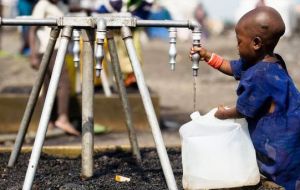MercoPress. South Atlantic News Agency
Lack of sanitation for 2.4 billion people undermining health improvements
 “To benefit human health it is vital to further accelerate progress on sanitation, particularly in rural and underserved areas,” according to Dr Neira.
“To benefit human health it is vital to further accelerate progress on sanitation, particularly in rural and underserved areas,” according to Dr Neira.  “What the data really show is the need to focus on inequalities as the only way to achieve sustainable progress,” said Sanjay Wijesekera
“What the data really show is the need to focus on inequalities as the only way to achieve sustainable progress,” said Sanjay Wijesekera  Access to adequate water, sanitation and hygiene is critical in the prevention and care of 16 of the 17 ‘neglected tropical diseases’ (NTDs)
Access to adequate water, sanitation and hygiene is critical in the prevention and care of 16 of the 17 ‘neglected tropical diseases’ (NTDs) Lack of progress on sanitation threatens to undermine the child survival and health benefits from gains in access to safe drinking water, warn WHO and UNICEF in a report tracking access to drinking water and sanitation against the Millennium Development Goals.
The Joint Monitoring Program report, Progress on Sanitation and Drinking Water: 2015 Update and MDG Assessment, says worldwide, 1 in 3 people, or 2.4 billion, are still without sanitation facilities – including 946 million people who defecate in the open.
“What the data really show is the need to focus on inequalities as the only way to achieve sustainable progress,” said Sanjay Wijesekera, head of UNICEF’s global water, sanitation and hygiene programs. “The global model so far has been that the wealthiest move ahead first, and only when they have access do the poorest start catching up. If we are to reach universal access to sanitation by 2030, we need to ensure the poorest start making progress right away.”
Access to improved drinking water sources has been a major achievement for countries and the international community. With some 2.6 billion people having gained access since 1990, 91% of the global population now have improved drinking water – and the number is still growing. In sub-Saharan Africa, for example, 427 million people have gained access – an average of 47,000 people per day every day for 25 years.
The child survival gains have been substantial. Today, fewer than 1,000 children under five die each day from diarrhea caused by inadequate water, sanitation and hygiene, compared to over 2,000 15 years ago.
On the other hand, the progress on sanitation has been hampered by inadequate investments in behavior change campaigns, lack of affordable products for the poor, and social norms which accept or even encourage open defecation. Although some 2.1 billion people have gained access to improved sanitation since 1990, the world has missed the MDG target by nearly 700 million people. Today, only 68% of the world’s population uses an improved sanitation facility – 9 percentage points below the MDG target of 77%.
“Until everyone has access to adequate sanitation facilities, the quality of water supplies will be undermined and too many people will continue to die from waterborne and water-related diseases,” said Dr Maria Neira, Director of the WHO Department of Public Health, Environmental and Social Determinants of Health.
Access to adequate water, sanitation and hygiene is critical in the prevention and care of 16 of the 17 ‘neglected tropical diseases’ (NTDs), including trachoma, soil-transmitted helminthes (intestinal worms) and schistosomiasis. NTDs affect more than 1.5 billion people in 149 countries, causing blindness, disfigurement, permanent disability and death.
The practice of open defecation is also linked to a higher risk of stunting – or chronic malnutrition – which affects 161 million children worldwide, leaving them with irreversible physical and cognitive damage.
“To benefit human health it is vital to further accelerate progress on sanitation, particularly in rural and underserved areas,” added Dr Neira.
Rural areas are home to 7 out of 10 people without access and 9 out of 10 people who defecate in the open.
Plans for the new Sustainable Development Goals to be set by the United Nations General Assembly in September 2015 include a target to eliminate open defecation by 2030. This would require a doubling of current rates of reduction, especially in South Asia and sub-Saharan Africa, WHO and UNICEF say.




Top Comments
Disclaimer & comment rules-

-

-

Read all commentsJust go to next to Retiro in Buenos Aires and you'll see/smell raw sewage in the street from the multi storied slum.
Jul 02nd, 2015 - 11:28 am 0don't wear sandals.
1 in 3 people, or 2.4 billion, are still without sanitation facilities – including 946 million people who defecate in the open.
Jul 02nd, 2015 - 12:18 pm 0And whose fault is that ?
I have a friend who is stationed in India now and he says people poop on the street and it doesn't get cleaned up until the Monsoon season 1x a year.
Jul 02nd, 2015 - 12:50 pm 0Animals.
Commenting for this story is now closed.
If you have a Facebook account, become a fan and comment on our Facebook Page!